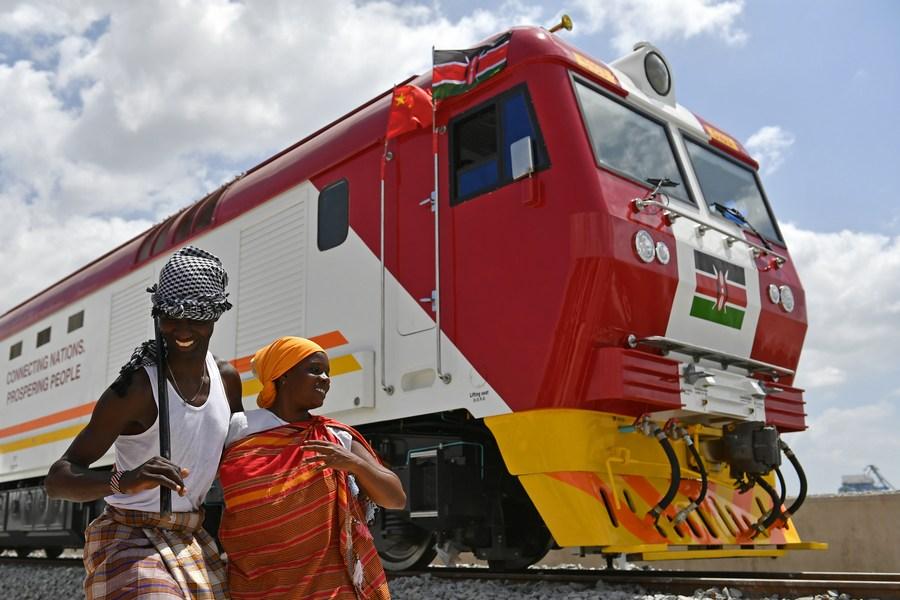
Ma Huihuang (Left), leader of the poverty relief team of Shibadong Village, together with villager Shi Linjiao, promotes local products via live streaming at Shibadong Village of Xiangxi Tujia and Miao Autonomous Prefecture, central China's Hunan Province, May 15, 2020. [Photo/Xinhua]
By Ljiljana Stevic
China's extraordinary economic transformation over the past 75 years has reshaped global development discussions. Since the 1980s, China has lifted over 800 million people out of poverty, a feat hailed by many observers as one of the most significant achievements in human development.
While much attention has been focused on China's domestic poverty alleviation efforts, the country's impact on poverty reduction extends far beyond its borders. Through development financing, infrastructure investment and knowledge transfer, China has emerged as a key player in international poverty alleviation, particularly in Africa, Southeast Asia and Latin America.
At the core of China's poverty alleviation strategy is the belief in fostering development through peaceful means, an idea rooted in millennia of Chinese thought. While China's political system and governing ideology have evolved, its fundamental approach to global poverty alleviation has been consistent: Build partnerships through mutual respect, and avoid the use of force or dominance. This guiding principle is reflected in China's foreign policy, which emphasizes peace, development and mutual benefit.
While China's domestic policies were rooted in its unique social and political context, its international poverty alleviation strategy reflects the belief that development should be customized to each country's needs. China rejects the idea of a one-size-fits-all model of development, recognizing that each nation has its own historical, cultural and social conditions that shape its path to progress.
Central to China's global poverty alleviation strategy is the Belt and Road Initiative (BRI), launched in 2013. The BRI, which now includes over 150 countries, aims to build infrastructure that facilitates trade and economic development, with poverty alleviation as a core goal. By connecting marginalized regions to global markets and services, China hopes to create conditions that foster sustainable development and reduce inequality.
Chinese officials have framed the BRI as a global public good, with President Xi Jinping highlighting its potential to promote shared prosperity. Indeed, infrastructure projects like roads, railways and ports can catalyze poverty reduction by increasing access to opportunities and resources.

Kenyans celebrate next to one of the first batch of locomotives that were made by Chinese companies for the Mombasa-Nairobi Standard Gauge Railway, Mombasa, Kenya, on January 11, 2017. [Photo/Xinhua]
However, the impact of the BRI on poverty alleviation has been met with mixed reactions. While some countries have benefited from improved infrastructure and economic growth, others have found themselves grappling with unsustainable debt. Critics accuse China of engaging in "debt trap diplomacy," where loans for infrastructure projects burden developing nations with economic vulnerabilities. This has led to debates over whether China's investments truly benefit the local populations or merely serve China's strategic interests.
Despite these criticisms, China's infrastructure investments have yielded significant success stories. In Ethiopia, for example, Chinese-funded industrial parks have created tens of thousands of jobs, contributing to a reduction in poverty in certain regions. Similarly, China's agricultural assistance programs in countries like Mozambique and Tanzania have improved food security through the transfer of technology and expertise.
Beyond infrastructure, China has played a crucial role in knowledge transfer and capacity building. Through initiatives like the Forum on China-Africa Cooperation (FOCAC), China has facilitated exchanges in agriculture, healthcare and education, offering developing nations the tools they need to address poverty on their own terms. China's experience in eradicating extreme poverty domestically has been held up as a model for other developing countries to emulate.
Agricultural assistance has been a major focus of China's poverty alleviation efforts in Africa and the Global South. Chinese experts have worked alongside local farmers to increase productivity using modern farming techniques and technologies. These efforts have not only helped boost food security but have also contributed to long-term agricultural sustainability in regions vulnerable to climate change and resource scarcity.
In addition to agricultural support, China's technical and vocational training programs have aimed to build human capital in developing countries. By offering scholarships and training opportunities to individuals from these nations, China has sought to equip them with the skills needed for economic growth. This approach reflects China's belief that human development is a critical component of poverty alleviation and that long-term partnerships can help foster independence rather than dependency.
China's global poverty alleviation efforts reflect its broader vision of international cooperation. By positioning itself as a partner in development, China has sought to promote a model of engagement based on equality and mutual benefit. This stands in contrast to the Western approach, which is often viewed by developing nations as paternalistic or rooted in self-interest.
China's focus on infrastructure development, knowledge transfer and capacity building has demonstrated that poverty alleviation is not a one-dimensional issue. It requires a multifaceted approach that addresses both immediate needs and long-term growth. While there are valid criticisms of China's methods, the country's commitment to reducing poverty on a global scale is undeniable.
As China continues to rise as a global power, its role in poverty alleviation will only become more significant. Whether through the BRI or capacity-building initiatives, China's contributions to global development are reshaping the poverty landscape. The international community must acknowledge China's efforts and recognize the importance of diverse approaches to tackling poverty in a rapidly changing world.
China's experience offers valuable lessons in how to balance economic growth with social development, and its successes in poverty alleviation provide a roadmap for other developing countries. As the world seeks new solutions to age-old problems, China's commitment to poverty reduction is an example of how targeted, sustained efforts can make a difference on a global scale.
Ljiljana Stevic, a special commentator on current affairs for CGTN, is the head of the Sinology Department and home director of the Confucius Institute at Banja Luka University.

 中文
中文



